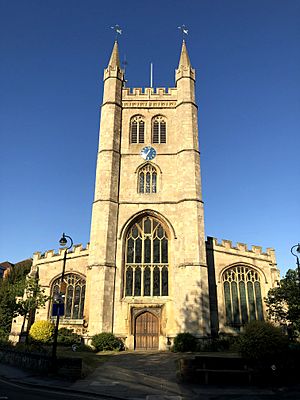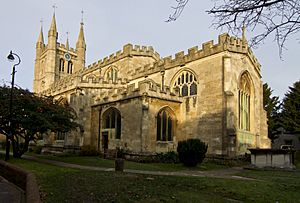St Nicolas Church, Newbury facts for kids
Quick facts for kids St Nicolas Church |
|
|---|---|
 |
|
| Location | Newbury |
| Country | England |
| Denomination | Church of England |
| History | |
| Founded | 1086 |
| Dedication | Saint Nicolas |
| Architecture | |
| Functional status | Active |
| Style | Gothic |
| Administration | |
| Archdeaconry | Berkshire |
| Diocese | Oxford |
St Nicolas Church is a special church in Newbury, Berkshire, England. It belongs to the Church of England. You can find it right in the middle of town, near the main bridge over the River Kennet. This church is a very old and important building, listed as Grade I. It's known for its beautiful and consistent Gothic style, called "Perpendicular Gothic." It's also much bigger than most local churches from its time.
Contents
History of St Nicolas Church
Early Beginnings
St Nicolas Church is named after Saint Nicholas, a bishop who lived a long time ago in the 300s. The very first church on this spot was built during the Norman times. We know this because a document from 1086 mentions it. In this old paper, a person named Ernulf of Hesdin gave the church to the Préaux Abbey.
Building the Current Church
The church you see today was completely rebuilt between 1509 and 1533. It was built in a style called "late Perpendicular Gothic." This style was popular in England during that time. If you look closely at the stone, you might see special symbols. One symbol is a pomegranate, which was a sign of Catherine of Aragon. Another is a portcullis, a gate-like symbol used by the Tudor dynasty. These symbols tell us the church was built when King Henry VIII was married to Catherine of Aragon. Their marriage ended in 1533.
Jack of Newbury's Contribution
A famous person from Newbury, John Winchcombe, helped build a big part of the church. He was often called "Jack of Newbury." A book from 1663 says that he built the church from the pulpit all the way to the tower. John Winchcombe passed away around the year 1520.
Modern Restorations
Later, during the Victorian era, the church was carefully repaired and updated. This is called a "Victorian restoration." Even though many changes were made, the main structure of the church stayed the same. In 1950, St Nicolas Church was officially recognized as a Grade I listed building. This means it's a very important historical site.
Church Architecture and Design
Layout of the Church
The church has a typical layout for a parish church. It has a main area called the nave and a special area near the altar called the chancel. It does not have transepts, which are arms that stick out from the sides. St Nicolas Church is quite large for its style. The nave has a high section with windows, called a clerestory. These windows let in light through five big windows on each side. There are also side sections called aisles, with five arches each. These aisles lead to smaller chapels. The chapel on the south side is still used as a chapel. The one on the north side is now a vestry, which is a room where clergy prepare, and it holds the church organ.
The Bell Tower
The tall tower at the west end of the church has ten bells. There is also a smaller bell called a Sanctus bell. Eight of the bells were made in 1803 by a company called Wells of Aldbourne. They were re-hung in 1933 with new parts. At that time, two more bells were added, making a total of ten. These two new bells were made in 1933 by Mears & Stainbank in London. The largest bell, called the tenor bell, weighs about 1093 kilograms.
Windows and Interior Features
Many of the beautiful stained glass windows in the church were added during the Victorian restoration. They were designed by Henry Woodyer. The company Hardman & Co. made these windows. Most of them were designed by John Hardman-Powell, and some later ones by Donald Taunton. You can also see decorative stone edges along the roof, called crenellations. The tower has pointed tops called pinnacles and small towers called turrets. Inside, there is a special wooden pulpit from 1607.
St Nicolas Church Today
St Nicolas Church is still a very active and important part of Newbury. It serves as an Evangelical Anglican parish church, offering preaching and worship. It also plays a role in the wider community. There is even a traditional English melody called 'Newbury' that is used for the hymn 'Jerusalem, thou city blest'.
 | Stephanie Wilson |
 | Charles Bolden |
 | Ronald McNair |
 | Frederick D. Gregory |


